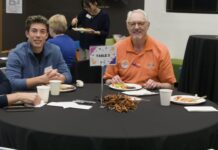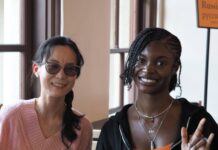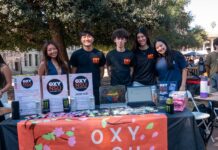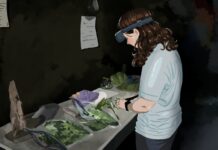Sam Pess (sophomore) and Waruguru Waithira (senior) were composed and honest while they spoke of the hardship and terror their grandmothers and great-grandmother endured. Their respect and admiration for their family are clear in the careful retelling of stories their elderly family members shared with them. Pess and Waithira’s grandmothers are from Greece and Kenya, respectively. Pess and Waithira both credit their cultural background as foundational to their strong relationships with their grandparents.
Pess spent the summer of 2018 home in Seattle to care for her grandmother, Kleopatra Pess, whom she calls Yiayia, which means “grandmother” in Greek. They spent nearly every day together, sharing a close and special bond. While Pess acknowledged it was challenging to set aside her own priorities for her grandmother, she felt it was the expected action to take.
“I remember a ton of my American friends asked,‘You’re not doing an internship? You’re going to stay home to take care of her?’ but to me it just felt very normal,” Pess said. “In Greek culture, the elders, and especially the elderly women, are super respected and you drop anything to care for them, so I grew up with that mentality. It’s pretty different from American retirement homes, which I completely understand because it’s really hard to take in a grandparent. But it was just the norm for us; it was never even a question.”
Kleopatra suffers from heart issues and vascular dementia, according to Pess. The challenges of caring for a family member are shared by Pess’ entire family, but her father, George Pess, emphasized that Sam carried the largest burden.
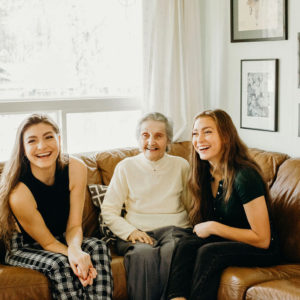
“Sam was the primary caretaker this summer,” George Pess said in a phone call. “It’s very challenging to see a very capable person becoming incapable of doing some basic things. It erodes you a little bit inside and it’s not for the faint of heart. You have to be able to pull something out of your love and affection for them that pushes you through certain times. I have never talked to anybody who can say, ‘Here’s a solution to this,’ because it’s dynamic and it’s changing all the time.”
George pointed out that Sam chose to do this for her grandmother.
“The most important thing to understand is that Sam did this on her own volition,” George said. “She wanted to do this, and we really appreciated that she did. When you think of what the typical college student does between their freshman and sophomore year, it’s not this. I give her a lot of credit because she brightened my mom’s life in a big way.”
When speaking of the stories Kleopatra has shared with her, Sam’s admiration and love come to the surface. Pess’ eyes widened and excitement filled her voice when she explained that her grandmother grew up in an orphanage in Nazi-controlled Greece during World War II after her parents passed. By age 14, Kleopatra worked full-time to care for her younger sister. When her aunt and uncle were only able to take in one child, she selflessly told them to take her sister and remained in the harsh conditions at the orphanage.
“She has seen crazy stuff. She’s a badass little 4’10” lady who takes no sh**. She puts things in perspective, which is great. It’s very grounding,” Pess said.
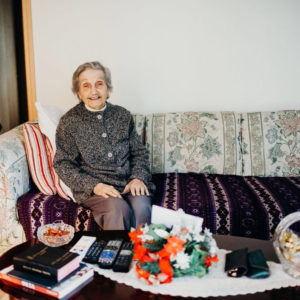
Kleopatra moved to New York City after the war and then to Seattle when Pess was born to help raise her, essentially becoming a third parent, according to Pess. Kleopatra lived with Pess’ family, so she was there for every moment of Pess’ childhood and taught her how to speak Greek from a young age. Today, they still talk nearly every day through phone calls and FaceTime.
“It’s really come full circle,” said Pess. “When I was growing up, she was tucking me into bed and making me food, and now I tuck her into bed and make her food. It was the hardest thing I have ever done, but I am so glad I did it because you learn a lot about yourself, about your family and about your heritage. It’s worth it.”
Waruguru Waithira’s story parallels Pess’ in that she, too, has a deep connection with the elderly in her family, stemming from a shared family history and an innate desire to ensure their well-being.
When Waithira last visited her family in the Kiambu District of Central Kenya during her sophomore year, she asked her grandmother, Waruguru wa Ngugi, and great-grandmother, Waithira wa Nderu, about their experiences living under colonial rule in Kenya and witnessing the traumatized nation regain independence. The result of these conversations brought a new depth and bond to their strong relationship, according to Waithira. When she speaks of her family, the pride she holds for her resilient female relatives and their shared cultural history is evident in the intensity of her voice as she carefully chose each word she said.
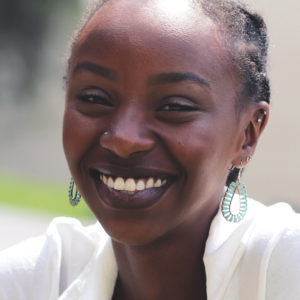
Similarly to Pess, Waithira feels an impulse to help her elderly family while in Kenya. Waithira’s constantly family cares for her great-grandmother, who is over 100 years old.
“When I went to Kenya in the summer, every day I would walk over to my great-grandmother’s house and make sure she had eaten, she was bathed and her clothes were changed,” Waithira said. “I just felt my body just driving me there. It doesn’t feel like I have to do it, I just want to.”
Waithira’s mother, Terry Ngugi, echoed this sentiment and emphasized the cultural significance of caring for the elderly.
“Of course these are our parents and they took care of us since birth,” Ngugi said via text. “It is our duty to do the same when they have no strength. The elderly people in our community are our second God. If you don’t treat them well, you and your generation will be followed by a curse from the ill-treatment.”
Waithira’s care and affection for her grandparents are rooted in trauma as much as it is in admiration. Understanding the history of cruelty, oppression and torture in Kenya, and in her own family, created a deeper appreciation for her elders. While in Kenya, Waithira created a documentary capturing interviews with six women who had endured sexual abuse and torture under colonization.
“All of these women were raped or beaten to the point where they lost consciousness, and it was something to hear how resilient these women are,” Waithira said. “Four out of the six women leaned in and looked straight in my face and said, ‘You are so lucky to be alive because our tribe was to be wiped out.’”
Throughout the 1950s, British colonists imprisoned over 1.5 million Kikuyu people, Waithira’s tribe, in camps modeled after Nazi concentration camps. It was during this time that the abuses Waithira’s elders described took place. A deliberate effort by the British government to commit genocide against the Kikuyu motivated violent and brutal methods of sterilizing women and castrating men. However, a guerilla resistance movement managed to not only sustain, but continue to grow the Kikuyu population during this time. Waithira’s great-grandmother was part of this resistance.
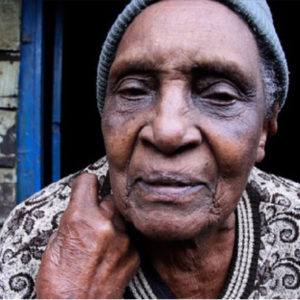
“It creates this relationship that is unbreakable when you know that women who supported you all your life have not only helped you grow up, but they are the foundation of why you are free,” said Waithira. “I am so grateful to them for enduring all the torture and all the trauma for me to come to the U.S. and get an education and tell their stories. They remind me every time we are together. They say, ‘I suffered because of you,’ and that makes me feel so much closer to them, and I am grateful.”
Despite this, British colonists have erased much of the history of the atrocities of colonization, according to Waithira.
“There is this amnesia about what happened during the colonial administration that is very disgusting,” Waithira said. “It is disgusting because we cannot talk about anything that happened in schools. I have to be their voice. They are 106; they are dying.”
While this history is forgotten in many history classes, the trauma of these experiences has been passed from generation to generation in Waithira’s family. One story Waithira shared from her documentary was from her grandmother’s childhood.
“She was sent to a field where there was a film screening,” Waithira said. “The film screening was of a village called Lari in Kenya. It doesn’t exist anymore. The whole village, around 3 a.m., was surrounded by colonial soldiers. They set all the huts on fire and anybody who was running out, their stomachs were cut open if they were pregnant or their kids were just killed. My grandmother remembers at a young age, younger than us, being pushed into this field to watch a screening of how the British recorded this whole massacre. They remember just watching all these people die. There was one survivor of that whole village.”
Waithira witnessed how the trauma of this moment and countless others have been passed down to her mother and to her own self. As a result of this shared pain, her family members care deeply for one another. She related this trauma to Americans in a toxically competitive society that prevents family members from spending time together, according to Waithira.
“It’s a different trauma,” said Waithira. “It’s violent trauma versus absence, which is very valid. That is traumatizing. Even with the trauma in my family, we share a strong love.”
This second kind of trauma — the trauma of absence — Waithira spoke of, illuminated larger issues she sees in the way Americans often care for their elderly.
“There is no reason you should not take care of your parents when they get older just because they were absent in your life,” said Waithira. “You should still respect them. You are here, you’re breathing and you’re experiencing life and that is something that everyone should be grateful for. Trauma is not something we should put on one another. Be there for them.”
![]()
















